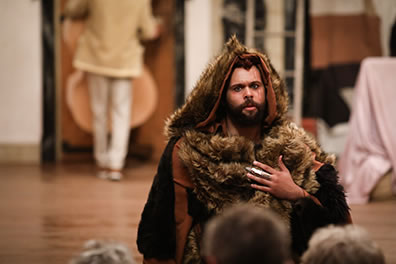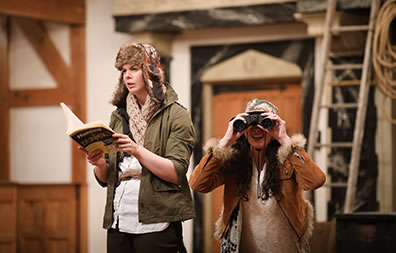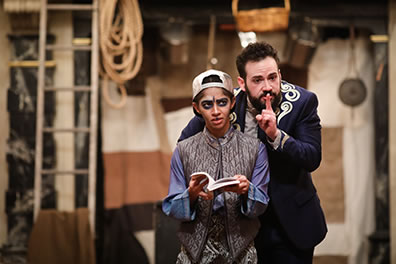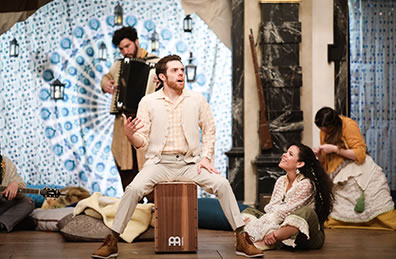16 Winters, or The Bear's Tale
Reflecting on Shakespeare
In a House of Mirrors
By Mary Elizabeth Hamilton
American Shakespeare Center, Blackfriars Playhouse, Staunton, Virginia
Saturday, May 11, 2019, D–6&7 (center stalls)
Directed by Amanda McRaven
In repertoire with The Winter's Tale

The Bear (Topher Embrey) begins his tale in the American Shakespeare Center's production of Mary Elizabeth Hamilton's 16 Winters, or The Bear's Tale at the Blackfriars Playhouse. This riff on The WInter's Tale is the company's second Shakespeare's New Contemporaries production, Photo by Lindsey Walters, American Shakespeare Center.
Mary Elizabeth Hamilton's new play has two titles, 16 Winters, or The Bear's Tale. Note that the latter is not a subtitle relegated to parenthesis. This play features two distinct but intertwined tracks, a story about 16 winters and a tale told by a bear. Its most engaging relationship, though, is with another play, William Shakespeare's The Winter's Tale.
This is the second offering in the American Shakespeare Center's ambitious Shakespeare's New Contemporaries initiative to solicit new plays that pair with each of the 38 plays in the traditional Shakespeare canon. The selected works earn a $25,000 prize for the playwrights and a world premiere for the plays in tandem with their paired plays at the American Shakespeare Center's Blackfriars Playhouse in Staunton, Virginia. Amy E. Witting's Anne Page Hates Fun, riffing on The Merry Wives of Winter, led off the project, debuting in February as part of the company's Actors' Renaissance Season. The company's touring troupe, returning to the Blackfriars at the end of its six-month, 14-state, 28-city Hand of Time Tour, is premiering 16 Winters, or The Bear's Tale as part of the spring season. The new play joins the tour repertory of The Winter's Tale, Shakespeare's The Comedy of Errors, and Sophocles' Antigone. The next Shakespeare's New Contemporaries selections, Anchuli Felicia King's Keene, a companion piece to Othello, and Emma Whipday's The Defamation of Cicely Lee, a companion to Cymbeline, are slated for production next year.
16 Winters, or The Bear's Tale sets an exemplary standard while offering three paths to satisfaction: Hamilton's clever script and its perceptive themes, the play's carnival house-of-mirrors reflection on The Winter's Tale, and the cast. This is a heckuva talented troupe of actors in their verse-speaking skills, character-development intelligence, physical capacities, musicianship, and handling of Shakespeare's original staging conditions: universal lighting, no sets and few props, no electronic or digital effects, and audience members in close proximity, some sitting on the stage. This Saturday matinee performance of 16 Winters, or The Bear's Tale leads off a triple crown of artistic triumphs that continues through this Mother's Day weekend with an elegiac, meditative Winter's Tale and a delightful romp through The Comedy of Errors (we didn't see Antigone).
The point of Shakespeare's New Contemporaries is not necessarily to retell Shakespeare's plays but to vibe off the originals—the modern play in conversation with the Shakespeare play. At first glance, Hamilton seems to be retelling The Winter's Tale in a modern setting with current archetypal characters using derivations of Shakespeare's character names and parallel titles (kings and queen, princes and princess, bear). However, as her play's plot and themes develop, it enters into a richly rendered conversation with The Winter's Tale in the same way Hamlet informs Tom Stoppard's Rosencrantz and Guildenstern Are Dead and vice versa.
This is an intelligent troupe of actors, and Director Amanda McRaven's credits include the Lincoln Center Directors Lab, a Fulbright Award to develop community-based theater in New Zealand, and founding the Los Angeles Lady Arm Wrestlers. She began her professional theater career as an American Shakespeare Center actor and became the company's director of education. I didn't have the chance to talk with any of the company, even on the new play's world premiere weekend, but I do have the perspective of seeing Hamilton's play a couple hours before Shakespeare's. I can't help feeling that while the actors' experience with The Winter's Tale probably provided a foundation for their work in 16 Winters, or The Bear's Tale, their character explorations in Hamilton's play seem to have influenced the readings of their Shakespeare characters, as well.
16 Winters, or The Bear's Tale opens with the flip side of the crux scene in The Winter's Tale, when Leontes, king of Sicily, defies Apollo's oracle and orders the trial of his wife, Hermione—accused of adultery with his best friend, Polixenes, king of Bohemia—to continue. Immediately, Leontes' young Prince Mamillius dies, and Hermione faints and is soon reported by her attendant, Paulina, to be dead. Hamilton's play begins with Her, "a Queen" (Ally Farzetta, who also plays Hermione in The Winter's Tale), and Pauly (Annabelle Rollison, who also plays Paulina) arriving at a wilderness hut. They are laughing at how they put one over on Leo, "a King" (Ronald Román-Meléndez, who also plays Leontes). They need to lay low for "some time" until Leo "comes around" in understanding the consequences of falsely accusing Her of having an affair with Pol, King of Bohemia (Kenn Hopkins Jr., who also plays Polixenes).
Her is not the Hermione I see in Shakespeare's play. Farzetta plays her as flirty, even with Pauly, pathetically unaccomplished, and spoiled. As Pauly shows off the rustic hut that is their new home, she brags that it has running water. "What other water would there be?" Her responds. As the years pass, we see Pauly referencing a volume of Hunting for Dummies as she learns survival in the wild. Her, meanwhile, continues to rely on Pauly for everything and is now admitting to growing romantic feelings for her friend. By the fifth winter, Her is bored as Pauly patiently and expertly knits scarves to while away the time. "You're so calm and collected, how do you do that?" Her asks. Replies Pauly: "I repress." (In addition to playing Paulina, Rollison plays Time in The Winter's Tale, knitting a scarf that she unfurls from the balcony representing 16 years passing.)
Shakespeare purists might cringe at these modernized portrayals of Shakespeare's heroines, but Hamilton is taking us deep into a key, often overlooked subtext of The Winter's Tale: maybe not subtext but a single line of text, when Time says, "Impute it not a crime to me or my swift passage, that I slide o'er sixteen years." Hermione doesn't get to slide o'er that span with swift passage: she's stuck in a hut somewhere, imprisoned by the woman advocating her case to Leontes and relying on faith in the oracle. Sixteen years is longer than the average lifespan of a dog. In human years, it's the difference between 32 and 48, 48 and 64, or, applied to the royal family at the center of The Winter's Tale, 20-something and 40-something as well as zero and 16 years old.
Initially alarmed at Her's spoiled-brat persona, I was more bothered by her flirtatious behavior, teasing Paulina that she might have had an affair with Pol. For me, Hermione's total innocence is fundamental to Shakespeare's exploration of Leontes' jealous fit, and productions that even hint at an overly flirtatious relationship I consider sexist by shifting responsibility for Leontes' behavior onto Hermione. In 16 Winters, Her assures Pauly no affair happened, but when later Her encounters Pol, each admits in riddling self-revelations of harboring an attraction for the other that they never let surface because circumstances wouldn't allow the consequences.


Top, Pauley (Annabelle Rollison, left) and Her (Ally Farzetta) hunt for food in Mary Elizabeth Hamilton's 16 Winters, or The Bear's Tale. Above, Leo (Ronald Román-Meléndez, right) talks with The Ghost of the Dead Prince (Constance Swain). Photos by Lindsey Walters, American Shakespeare Center.
This reflection on The Winter's Tale's opening scene strikes home for me. Productions I've seen range across the entire spectrum of behavior between Hermione and Polixenes that prompts Leontes' "Too hot, too hot" conclusion, from Hermione as disinterestedly formal with Polixines (Leontes is then completely delusional), to Hermione and Polixenes pawing each other (Leontes is then totally accurate). The truth, however, could be a naturally nuanced representation of the entire spectrum: genuine affection laced with flirtation (seeming or actual) and undertones of sexual attraction. I've been in such relationships and could always truthfully assert total fealty to my wife or the other woman's partner because my intentions never go beyond the satisfying sense that I could still be in the game. Plus, I've always set a clear, never-cross line. Then came an occasion when what I knew to be totally innocent appeared otherwise to others. Initially blindsided, on further reflection I realized what bothered me most was knowing the appearance to others had a root cause in me. Does Leontes suspect such roots even if neither Hermione nor Polixenes have no intent to let them sprout?
Leo is grappling with this question in 16 Winters. Standing at his wife's grave in his first scene, he contemplates suicide, but dismisses it as too easy. He's committed to dwelling on his guilt. Yet, he admits that, though he's certain he was wrong about Her and Pol, he remains pretty certain he had reason to believe he was right, and he has yet to navigate his way through this dubious nature of certainty. In scenes paralleling Her growing bored with life in Pauly's hut, Leo dives into his psychological turmoil through music, composing a succession of songs, from Dylanesque anger through bro-country defiance to, finally, a bit of Springsteenian angst (Román-Meléndez plays guitar for these numbers and is credited with composing the play's original music).
What literally haunts Leo, however, is not the death of Her: After all, the grave he's talking to is empty. The one next to it, however, is not, and its occupant turns out to be the most intriguing character Hamilton brings over from Shakespeare's play: the Dead Prince played by Constance Swain (she also doubles Mamillius and Perdita in The Winter's Tale). In purple shirt, black and silver scroll pants, gray quilt vest, backward baseball hat (costumes by Allison Dillard), and heavy black eye shadow with a blue streak from forehead to bridge of her nose and a dot on her top lip, Swain's ghost looks like a witch doctor in the guise of an 8-year-old boy.
He's angry: "You think you get a guide ghost after everything you did?" he asks of Leo. He's cynical: Contending his father is apologizing only to make himself feel better, the Ghost says, "The fact you feel stupid is beside the point." He suggests Leo turn to the arts to express his inner feelings and then plays Simon Cowell to his dad's musical explorations (sometimes playing cat's cradle, a talent Mamillius displays in this company's Winter's Tale). He complains how his father wouldn't allow him more freedom to do things when he was alive, such as hunting. "You just needed to grow a little," Leo says—and as Swain's Ghost gives him a withering look, Román-Meléndez's Leo catches himself. This line is the true start of Leo's path to redemption, realizing how he needlessly denied his son the chance to grow: no 16 winters for Mamillius.
Swain turns in an incredible performance as the Ghost. She is an actor of exquisite talent, which she has displayed in myriad roles at the Blackfriars, and her physical and intellectual range are on full display in 16 Winters along with a deep emotional essence. Swain's Ghost reminds us that while The Winter's Tale is categorized as a comedy and has a happy ending, Mamillius is one of two people who dies as a result of Leontes' jealous fit (Antigonus is the other, famously pursued by a bear). Swain's most poignant moment comes after the action has moved to Bohemia and the Ghost sees his sister, P. (Madeline Calais) for the first time. Leo has just met Her—they don't recognize each other after the passage of time—and the Ghost motions Leo to follow Her into the Bohemian house. The Ghost, though, doesn't follow. Swain holds the audience in her gaze for one long moment, then quietly exits the play.
Hamilton's plotline is surreally quirky and ridiculously fun, but is full of apt references and insightful touchpoints to The Winter's Tale. Her, forced to choose between Pol or Pauly for a love affair, instead chooses to find her daughter and heads to Bohemia. Bohemia is, simply, a place for Bohemians, a commune of artists waiting out a paralyzing winter storm: Julian, "an artist" (Michael Hahalyak); Spring, "an artist and peacemaker" (Jocelyn Honoré), and Shep, "a Bohemian" (Andrew Tung). P. is there, too, "a shepherd's daughter with the soul of a princess, or the other way around." Arriving through the storm is Flory, "a thinker" (Josh Clark, who also plays Florizel in The Winter's Tale). He strikes up an immediate attraction with P., much to the aggravation of Shep who has a crush on her (I've never seen an accordion played so aggressively as Tung does). The Bohemians give Her refuge, but when she runs out of money and jewelry to buy food for the commune, they turn on her like a pack of animals. Her flees into the wilderness, where she encounters Pauly, who has become a passionless libertarian survivalist, and reaches the palace, where Pol rejects her; she proved too human for him, not the statue of perfection he had idolized.

In Bohemia, Flory (Josh Clark, center) regales P. (Madeline Calais) with his feminist treatises as a jealous Shep (Andrew Tung, with accordian) watches while Spring (Jocelyn Honoré) works on her knitting. In Mary Elizabeth Hamilton's 16 Winters, or The Bear's Tale at the Blackfriars Playhouse, Bohemia is a commune. Photo by Lindsey Walters, American Shakespeare Center.
Hamilton mines the resources in Shakespeare's play to lay a feminist track in her play, highlighted by Her's speech on what really ails Leo. "He was born with a little flab of skin between his legs that stiffened in my presence, and probably yours, too, Pauly. And it made life that I had to carry for nine months." Flory is a strident male feminist spouting manifestos about rebuilding history through the eyes of women; these ideals are a sure path to getting laid. Of course, Flory is really the king's son in disguise, and as such his revolutionary stances come off as elitist idealism with no means for actual activism.
Another character living in the artist commune is The Bear. Topher Embrey, wearing a hooded fur coat, a single metal claw on one finger, and a large scar down the left side of his face from a fight for the right to mate (he won one such fight, lost the other), is very human in these Bohemian scenes. He holds conversations with his commune fellows but constantly hankers after food. He finally departs into the storm to get something substantial to eat and encounters a potential meal: exit Her, pursued by a bear, a frightening chase encompassing the interior periphery of the Playhouse, ending with, well, another loss (no spoilers here).
With The Bear's Tale, Hamilton uses Shakespeare's famous stage direction and takes The Winter's Tale into an entirely new but universally relevant dimension beyond Shakespeare's play: man's relationship with nature. Through the first half of The Bear's Tale, Embrey's Bear serves as a chorus, setting time sequences and commenting on what it is to be a man or to be a bear. For a bear, life is a sequence of natural desires: food, sex, warmth, the sun. Man has added other desires: dignity, perfection, amassing wealth, gaining power. "Those desires make man turn unpredictable and unreliable," The Bear says. He describes tracks across a field of snow: the animal's tracks form a straight line as the creature pursues an objective; man's crisscrosses across the landscape, always trying to get time back.
Embrey, an accomplished actor whose talents we first encountered at Orlando Shakespeare Theater and who killed playing Mrs. Jennings in last year's American Shakespeare Center's touring troupe production of Jane Austen's Sense and Sensibility, cuts a striking balance as The Bear. In the role of narrator, he exudes a mix of fascination and danger. In the Bohemian scenes, he's a comic, human character though he maintains an aspect of ferocity in his voice and manner. He is all ursine as he pursues Her as his first meal in days. His final speech at the play's climax cuts to the core of human nature that underlies the plot turns of The Winter's Tale. "We build structures and cities, and we claim we've won. We have beaten nature," The Bear says. Humans, though, are a species of animal, and no matter how much we try to displace that with our outer civilized selves, the beasts within keep "whispering in our ear."
"Nature always wins," The Bear says, even as, represented in the moment in which The Bear speaks this, man is doing his darnedest to defeat nature. The visual image of the moment is subtly poignant. Natural tragedies, such as a man being eaten by a bear or a storm overwhelming a ship and drowning its passengers, are hard to take, but the tragedies perpetrated by man are harder to comprehend because man is supposed to be civilized.
16 Winters or The Bear's Tale ends with the characters not quite finding what they were looking for. The audience, however, gets closer to the truths within The Winter's Tale, which is exactly what Hamilton is searching for.
Eric Minton
June 8, 2019
Comment: e-mail editorial@shakespeareances.com
Start a discussion in the Bardroom



 Find additional Shakespeareances
Find additional Shakespeareances